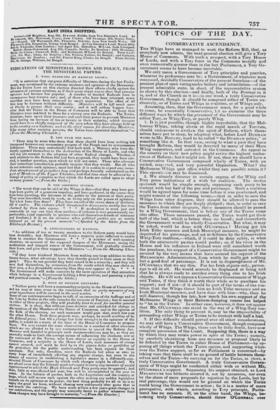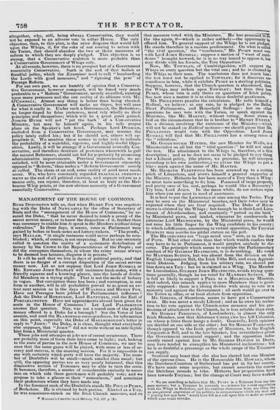TOPICS OF THE DAY.
CONSERVATIVE ASCENDANCY.
Tun Whigs have so managed to work the Reform Bill, that, as everybody now admits, the next general election will give a Tory House of Commons. With such a prospect, with a Tory House of Lords, and with a Tory force in the Commons morally and even numerically greater than in the last Parliament, a Tory Go- vernment seems to have become inevitable.
We only mean a Government of Tory principles and practice, whatever its professions may be; a Government, of whatever men composed, decidedly Conservative of the present franchise—of the present plan of open voting under bribery and intimidation—of the present admirable state, in short, of the representative system
as shown by this election—and finally, both of the Peerage as it is, and of the Church as it is—in one word, a truly Conservative Government, though it should be composed either of Tories ex- clusively, or of Tories and Whigs in coalition, or of Whigs only.
Assuming, then, that the Government must, for a good while to come, be essentially Conservative, let us examine the three different ways by which the personnel of the Government may be either Tory, or Whig-Tory, or purely Whig.
I. It is just possible, though highly improbable, that the Mel- bourne Whigs, taking alarm at the rapid march of Toryism, should endeavour to awaken the spirit of Reform, which them- selves have put to sleep, by adopting what, before Lord DURHAM wrote to Mr. BOULBV, used to be called "the DURHAM policy,- or something like it. In that ease, seeing to what a pass they have brought Reform, they would be deserted by many of their Mere Whig supporters, and outvoted in the Commons. An appeal to the country on their new policy might revive the highest enthu- siasm of Reform; but it might not. If not, then we should have a Conservative Government composed wholly of Tories, with an united, respected, and very powerful Opposition. What ! the Melbourne IViligs quit office whilst they can possibly retain it ? This specula;ion may be dismissed.
2. We already discover in certain organs of the Whig and
Tory press indications of a wish for coalition. The ?nodes operandi would be simple enough, supposing each party to be content with but half of the pay and patronage. Such a coalition would be agreed upon for some time before it was proclaimed, anti might consist of the following terms,—that in order to save the Whigs from utter disgrace, they should be allowed to pass time measures to which they are deeply pledged ; that, in order to save the Tories from utter disgrace, tlioe measures should be passed by a Whig Government, that is before any of the Tories came into office. Those measures passed, the Tories would get their half of the loaf, which is better than no bread ; and thenceforth the Government would be wholly Conservative. But what, it may be asked, would be done with O'Costsniu. ? Having got his Irish Tithe measure and Irish Municipal measure, he might be deprived of his patronage, and set at defiance by the Conservative Whig-Tory coalition,—which, if it could be done safely, is. what both the aristocratic parties would prefer; or, if his votes in the House and his influence in Ireland were still considered. worth the purchase, his support of a Conservative Government might be secured by the very means that have secured his support of the MELBOURNE Administration, from which he reallyxot nothing but. a good deal of patronage. It is not in disparagement of Mr. O'CONNELL that we say this. For his Irish objects only, patron- age is all in all. He would scarcely be displeased at being told that he is always ready to sacrifice every thing else to his Irish objects. Ile w ill not oppose a Conservative Government of W higs and Tories, if they think it worth their while so to purchase his support; and if not—if it should be part of the terms of the coa- lition that the Whigs throw him an Irish Tithe measure and an Irish Municipal measure, and have done with him—why, then he will discover, though too late, how much his own support of the Melbourne Whigs in their Reform-damping course has helped to "let in the Tories." In either case, however, it does not appear that Mr. O'Cos.istam. can stand in the way of a Whig-Tory coa- lition. The only thing to prevent it, may be the impossibility of persuading either Whigs or Tories to be content with half a loaf.
3. If this difficulty should prevail over all other considerations, we may still have a Conservative Government, though composed wholly of Whigs. The Whigs, there can be little doubt, have now
complete possession of the Court. Supposing this, there is a way by which they may retain power in spite of the Tories ; namely,
by carefully abstaining from any measure or proposal likely to
be defeated by the Tories in either House of Parliament—by op- posing all things which the Tories oppose, and supporting what-
ever the Tories support, so far as Parliament is concerned—by
taking care that there shall be no ground of battle between them- selves and the Tories—by carrying on for the Tories, in short, a truly Conservative Government. A truly Conservative Govern-
ment of Whigs might be conducted either with or without Mr. O'CorstsELL's support. Supposing his support obtained, as Lord
MELISOURN/E has hitherto secured it, not by measures, nor even
by the sham of mere proposals for rejection by the Lords, but by real patronage, this would not be ground on which the Tories
could bring the Government to action ; for it is a matter of mere prerogative, with which, according to Tory principle, Parlia- ment has no concern. If, on the other hand, the Whigs, be- coming truly Conservative, should throw Moreau. over
altogether, why, still, being always Conservative, they would not be exposed to an adverse vote in either House. The only objection, then, to this plan, is the utter disgrace that would fall upon the Whigs, if, for the sake of not coming to action with the Tories, they should abandon the two or three measures of reform to which they are deeply pledged. This objection is so strong, that a Conservative coalition is more probable than a Conservative Government of Whigs only.
At all events, however, there is no prospect but of a Government essentially Conservative. Such is the end of that foolish or fraudful policy, which the Examiner used to call "bombarding the Lords with good measures," and "ripening the pear" of Peerage Reform. For our own part, we are humbly of opinion that a Conserva- tive Government, however composed, will be found very much preferable to a" Reform" Government, merely so-called, existing upon many pretences and the one reality of its alliance with Mr. O'CONNELL. Almost any thing is better than being cheated. A Conservative Government will make no dupes, but will pass for what it really is. Under such a Government, the Reformers, no longer duped by false pretences. must rely wholly on their principles and themselves; which will be a great point gained. JOSEPH Hums will not " pat the back" of a Conservative Ministry, but may be himself again, in his only proper place on the Speaker's left hand. Perhaps Lord Duititam, excludod from a Conservative Government, may resume the policy lately called his ; but if he should not, others will ap- propriate it. We mention these names in order only to indicate the probability of a watchful, vigorous, and highly-useful Oppo- sition. Lastly, it will be strange if a Government avowedly Con- servative, and therefore destitute of pretences wherewith to gull the earnest Reformers, should not bid for popularity by promoting administrative improvements. Practical improvements, we are satisfied, will be more attainable under a Government ostensibly opposed to "Reform," than under a "Reform Government" merely so called. The sham at an end, some reality of good must needs occur. We, who have constantly regarded PRACTICAL IMPROVE- MENT as the end of all political exertion, and organic reform as a means only, can rejoice, therefore, at least as truly as the Mel- bourne W big prints, at the now obvious necessity of a Government essentially Conservative.



























 Previous page
Previous page